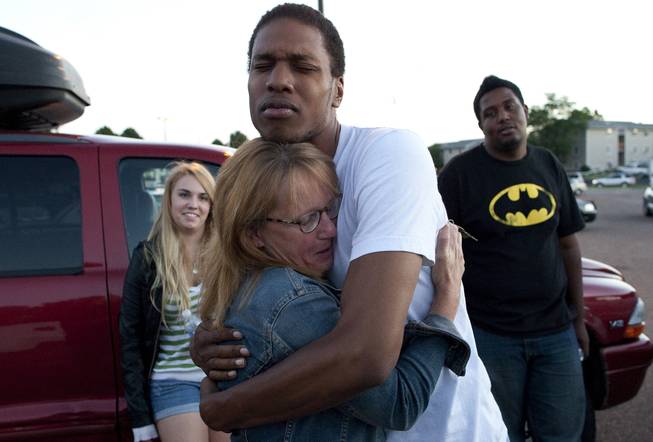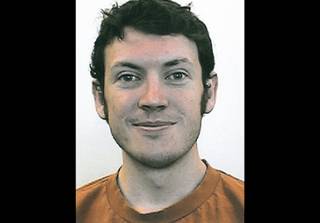
Barry Gutierrez / AP
Judy Goos, center left, hugs her daughter’s friend, Isaiah Bow, 20, while eyewitnesses Emma Goos, 19, left, and Terrell Wallin, 20, right, gather outside Gateway High School where witnesses were brought for questioning Friday, July 20, 2012, in Aurora, Colo. A gunman wearing a gas mask set off an unknown gas and fired into a crowded movie theater at a midnight opening of the Batman movie “The Dark Knight Rises,” killing at least 12 people and injuring at least 50 others, authorities said.
Saturday, July 21, 2012 | 2 a.m.
KANSAS CITY, Mo. — Like the rest of America, Jessika Miller, 21, of Blue Springs, Mo., awoke Friday to what she called “shocking” news of a massacre in a movie theater in Aurora, Colo., with a dozen people dead and dozens more wounded.
She was horrified. Yet she also concedes that she, along with her two sisters and their friend, Mike Enriquez, 27, of Kansas City, Mo., had another reaction to the mass shooting, a response that experts worry is becoming ever more commonplace.
“Now, it’s expected,” Miller said. “It’s happened so often.”
“It’s not the way it should be,” said her sister, Sarah Miller, 18, “but it’s the way it is.”
Said Enriquez, “It’s a part of life.”
For them, that is true.
It’s been 13 years since two gunmen in April 1999 killed 12 students and a teacher at Columbine High School in another Denver suburb.
In little more than half a generation, the Miller sisters and those younger have grown up among headlines, 24-hour news stations and, now, the Internet, YouTube and texts flashing accounts of one senseless rampage after another:
Ten killed by a roaming sniper in the Washington, D.C., area in 2002; five Amish schoolgirls shot in Pennsylvania is 2006; 32 people killed in 2007 at Virginia Tech; five dead plus the shooter at North Illinois University in 2008; 77 killed in 2011 in Utoya and Oslo, Norway; U.S. Rep. Gabrielle Giffords and 18 others shot, with six killed, in 2011 in Arizona.
Meanwhile, the defining disaster of their lifetimes was the terrorist attacks of September 11, 2001, and the wars in Iraq and Afghanistan that followed.
Thus it is hardly surprising, say sociologists, psychologists, criminologists and others, that what they suspect is a growing portion of the U.S. populace, although initially stunned, might quickly grow desensitized to such reports.
“My general sense is that we are becoming somewhat inured to the outrageousness of these acts,” said Robert Brenneman, who has studied gang violence in South America as a sociologist at Vermont’s Saint Michael’s College. “We just kind of resort to a kind of collective hand-wringing for a week or two. Then we wait for the next Virginia Tech. And we just hope it won’t be my college, or my school, or my movie theater.”
In The New Yorker’s online version, columnist Adam Gopnik reflected the same sentiment just hours after the Aurora shooting. “Only in America,” he wrote, “are gun massacres of this kind routine, expectable, and certain to continue.”
Brenneman said that he finds himself both curious and disturbed by what he sees as the blase societal reaction in the face of such repeated events.
“I have the sense,” Brenneman said, “that perhaps ‘outrage’ isn’t the best word, but widespread lament is lacking in the U.S. compared to, say, a Norway, or a Japan.
“It’s not like these kind of things only happen in the U.S., but they do happen with enough frequency that it is hard to imagine why with the second, or third, or fourth, or 10th shooting spree like this, it doesn’t lead to a social movement to take radical steps to make sure this doesn’t happen again.”
At the University of Missouri, Bruce Bartholow, a psychologist and associate professor in the Social Cognitive Neuroscience Lab, has studied the effects of repeated exposure to violence. Primarily, he has studied brain wave activity following play on violent video games.
Those studies, he said, have shown a desensitizing effect. At this time, he said, there is no clear evidence or research showing a similar effect on society as a whole in the face of repeated violence.
“There is an ongoing debate within the scientific literature whether society has become more violent or less violent over time ... going back to caveman days,” he said. “Depending on the evidence you use, you can tell one story or the other. There have been random acts of senseless killing as long as there have been people.
“But if you look at more modern history, society has become more accepting of the kind of violence that occurs. ... It has to become more shocking to get anyone’s attention.”
Mai Fernandez, executive director of the National Center for Victims of Crime, said that although the rate of violent crime has been falling steadily in recent years, she thinks stories of mass shootings open old wounds for former crime victims and hurt the national psyche.
“There’s a fear that you can’t protect yourself from this,” she said. “People are, more and more, feeling that it could be them. They are thinking, ‘The lone wolf is out there, and I could be a victim.’"
Fernandez said she hopes the Colorado shootings will lead to a productive dialogue on preventing gun violence.
“We need to sit down as a nation and say, ‘This cannot happen again,’ “ she said.
But criminologist Gordon Crews of West Virginia’s Marshall University said that, despite the horror of such attacks, they often fade quickly from the nation’s attention.
“It’s kind of like, ‘What’s the daily tragedy going to be?’" he said. “Then you wait for the next tragedy. ... You get up the next morning and forget about it.”
Right now, Felicia Hanks of Kansas City is not forgetting about it.
She has a 15-year-old son. She knows that the next time he goes to a movie, or just about anywhere, she is going to worry.
“You can’t be safe going out to pick up a gallon of milk,” she said. “Going out and having a good time? You just can’t do it anymore.
“You have to worry, every place you go.”


Join the Discussion:
Check this out for a full explanation of our conversion to the LiveFyre commenting system and instructions on how to sign up for an account.
Full comments policy